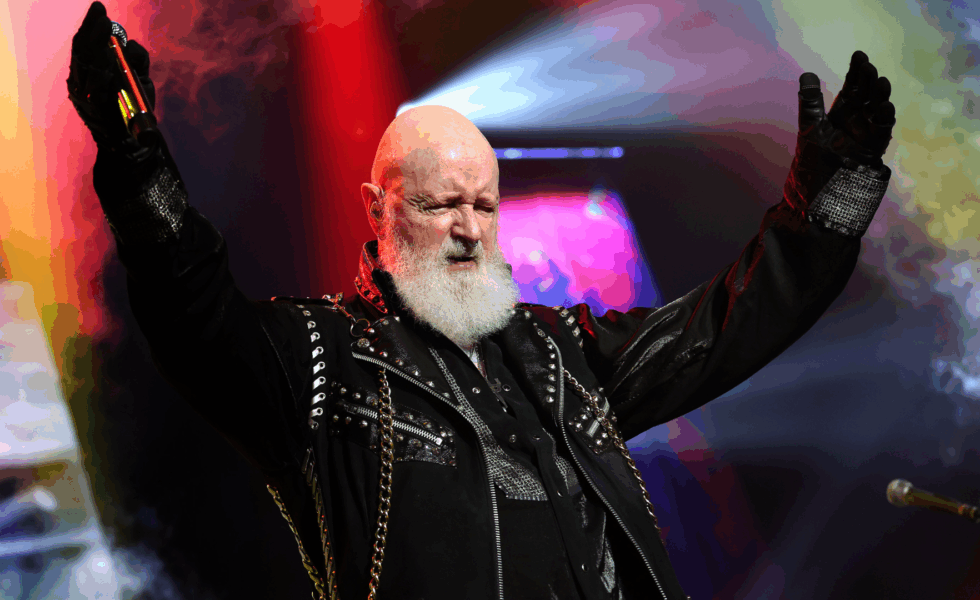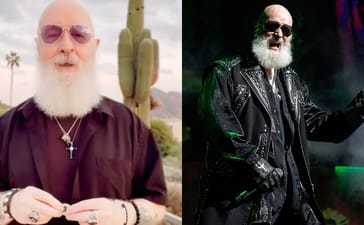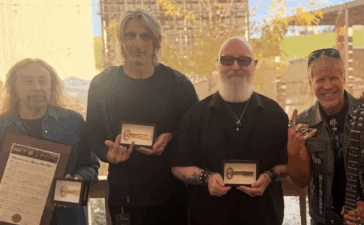Judas Priest singer Rob Halford opened up about his sobriety during a recent Q&A session with former Megadeth bassist David Ellefson over the weekend. The singer would reveal the moment that made him realise he needed to get sober, and how rock and metal’s relationship with drinking has changed over the years.
Judas Priest frontman Rob Halford opened up about his sobriety during a recent Q&A session with former Megadeth bassist David Ellefson over the weekend at Rock ‘N’ Roll Fantasy Camp in Scottsdale, Arizona.
The singer went on to detail his journey with sobriety, which started 39 years ago and how it affected him, while also sharing keen observations on how rock and metal’s relationship with drinking culture has also changed.
Here is what the legendary metal singer said at the event (transcribed by Blabbermouth):
“My first sober show [with Priest] was at the Tingley Coliseum in [May] 1986 in New Mexico, Albuquerque. That was my first sober show, and I was absolutely terrified. I was terrified. And the first time I sang clean and sober was just something so remarkable. [I was] so elevated, just to feel the music for the first time in its purest sense, uncluttered, in reality.”
“And to hear yourself and your voice, what it can do, your bandmates. I didn’t need this stuff – I didn’t need any of that to get me where I am.”
Halford would go on to discuss how addiction has cut the lives of so many artists in music short, and how he’s seen metal’s relationship to drugs and alcohol change over the years.
“Our business used to have a horrible trail of losing people and people getting into really bad ways. A lot of us have recovered. Nowadays, when the tour bus pulls up [to a venue], the guys [from the bands] jump off the bus, and they pull out weights and are skipping rope by the luggage racks and that’s great.”
“It’s less of a thing no, ’cause it was peer pressure. You’d read these rock and roll stories about rockers doing crazy stuff, dangerous stuff. You felt like it was a rite of passage, that you had to go through that, for some extraordinary reason. ‘Oh, I do that because so-and-so did that.’ And then you’re giving your life away for some other purpose, which you should never do.”
Halford would then add, “So anyway, by the grace of God go I, and one day at a time. I never wanna wake up feeling sick and tired, which is what I used to do.”
A member in the crowd would go on to ask if Halford had a “particular moment of clarity” which changed him, prompting Halford to reply: “It’s difficult to express that moment, but when you’ve had your stomach pumped, because you were so sick of feeling sick and everything around you was so black and dark that you just wanted to leave all of that, that was part of the first major mental crisis that I went through,” explained the singer.
“Anybody in recovery will tell you that there’s a point where they’re just sick and tired of feeling sick and tired anymore, and then you make a change. And you think it’s gonna be easy from that point on. No. Every day – for me every day, when a beer commercial comes on, or a hard liquor commercial comes on, I’m [feeling an emotional effect],” Halford shared.
“It’s amazing. It never, ever leaves you. That’s why it’s called an addiction. I’m an addict. I’m a recovering alcoholic and drug addict. So it never, ever leaves your body. The strength and power that you pull on from your higher power, from the tools that you have from staying clean and sober, is a reference right now. It’s always ticking in the back of your mind. So, I’m just so happy and grateful that I’m at this place and living in the moment.”
This wouldn’t be the first time the venerable Judas Priest singer had opened up about his sobriety and challenges with it while being on the road.
In 2020, Halford would share in an interview with the Across The Board podcast that staying clean while touring was still a challenge. “It’s not easy,” Halford admitted. “It’s verry much a day at a time. You’re given all the tools and resources from your rehab experience. I use ’em every day. A lot of it is just like mental notes – talking things through. Sometimes I speak ’em out; a lot of it is internal. So that’s really vital on a day-to-day level of sobriety.”
“I can only say it’s a miracle that I’ve got that far from January the 6th, 1986 to December the 1st, 2020 without slipping once. And I’m not boasting, because it’s all the past – that’s the past; it’s gone. I live in the moment. I don’t think about yesterday or tomorrow; I’m living now.”
Judas Priest are set to return to the studio in 2026 to record a follow-up to 2024’s Invincible Shield and are expected to take the album on tour once it’s released.










